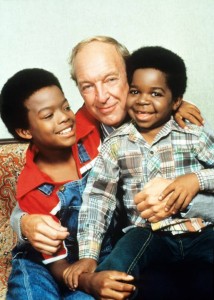I’m sure I don’t remember Gary Coleman quite as well as most people. I tuned in to “Diff’rent Strokes” long after it had gone into syndication, and never developed the kind of ironic affection for it that so many Gen Xers did. But what I do remember him from was “On the Right Track,” a movie in which he played a homeless shoeshine kid, living in a train station, who had a special power: When he shined shoes, he could pick winners from the Racing Form.
Predictably, the discovery of this ability meant everyone wanted to take advantage of our young hero, who still somehow managed to sail through the movie without losing his imperturbable optimism. Of course, he was acting.
Which is pretty much the story of Gary Coleman himself. Trapped forever in a child’s body due to a kidney ailment, he found little success as an adult, but whenever I saw him on the news—whether for suing his parents for mismanaging his $3.8 million trust fund or for just causing a ruckus—he maintained that chubby-cheeked childlike cuteness. He could turn on the charm for the cameras. Again, he was probably acting.
Or maybe not. He may have played an orphan on TV, but he was one in real life, too—a spiritual orphan, cut off from his family and desperate for someone to take care of him. That was Conrad Bain’s job, and it was our job, too, even though he was just as desperate to prove he didn’t need anyone. “Family never meant anything to me,” he said in 2003, “but a whole lot of trouble that I don’t need.” But what do you do with kids—teenagers, especially—who say they don’t need you? You try even harder.
The ridiculousness of his death is that he died after falling at home and hitting his head—meaningless and bathetic, it gives us no easy way to sum up his existence. I can almost imagine telling the young Gary that’s how he’d meet his end: After a lifetime of health problems, money problems, work problems, and behavior problems, you’ll trip, fall, hit your head and die at 42. I think we all know what he’d say to that.


Nice, though the affection was not ironic for many of us Gen Xers – at least while the show was still being produced, prior to the cast-member troubles. Coleman was a quality entertainer, as many of his (much older) peers recognized:
http://www.washingtonpost.com/wp-dyn/content/gallery/2010/05/28/GA2010052803076.html?hpid=topnews
And yes, it was Conrad Bain’s job.